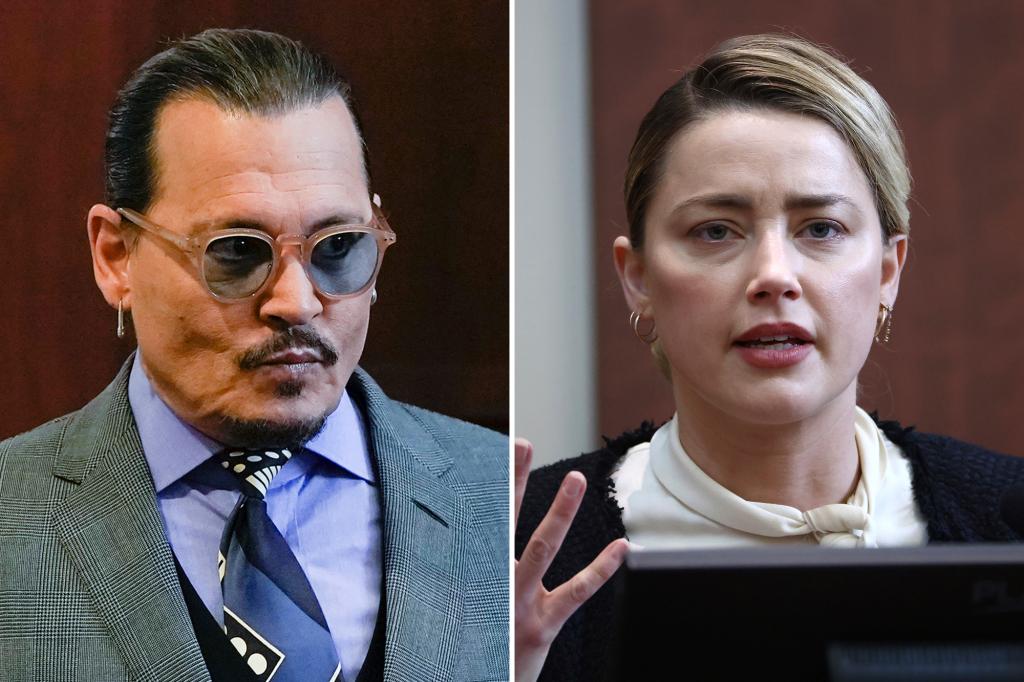Johnny Depp faces an uphill battle in his defamation lawsuit against Amber Heard – and the fact that he’s so famous makes his case even tougher to win, legal experts told The Post this week.
The “Pirates of the Caribbean” star’s team will have to meet a higher legal bar to prove their case because of their client’s high-profile status, the experts said.
“The First Amendment protects our rights to discuss matters of public concerns – which arguably, in today’s day and age, includes celebrities’ lives,” explained California entertainment lawyer Mitra Ahouraian.
Defamation cases are hard to win in general — and even more difficult when they involve celebrities, because there’s an added burden of proving “actual malice” on the part of the defendant (Heard).
“He has this additional burden which is not easy,” Ahouraian said.
But Depp, 58, doesn’t appear to be sweating the difficult nature of his case — and is spending the week off from trial in Europe, a source close to him said.
“Johnny is in Europe taking some time out to rest for a few days, hang out with old friends, playing music, and is taking long walks in the countryside,” the source said.
The “Edward Scissorhands” actor sued Heard, 36, for $50 million in defamation over a 2018 Washington Post op-ed piece she penned calling herself “a public figure representing domestic abuse.”


Heard did not name Depp in the essay. But his attorneys argue that he still smeared him, because it was clearly referencing allegations of domestic abuse Heard made when she filed for divorce in 2016.
The “Aquaman” actress has fired back with her own $100 million countersuit alleging Depp is carrying out a “smear campaign” to ruin her life.
The two have been duking it out in a Virginia court for four weeks over the claims, though the proceedings went on break May 5, after Heard’s second day on the stand, and will resume Monday.

Halim Dhanidina, a former California judge and current criminal defense lawyer, said two challenges in these cases are that opinions can’t be considered defamatory, and that the statements being challenged must be proven false.
“Defamation cases are generally difficult, largely because you have this tension between a person’s First Amendment rights to express themselves and the difference between a statement of opinion and a statement of fact,” Dhanidina said.
“Statements of opinion generally speaking are not something for defamation suits because you can’t prove or disprove what someone’s opinion is or whether it’s accurate.”
With public figures, such as Depp and Heard, you need to go beyond proving that statements were false — and show they were made with “actual malice,” the experts said.

Actual malice is a legal standard that a false statement had to have been made knowing it was untrue or had to have been made recklessly – meaning the person didn’t bother to check if their statement was true.
“Neither of them, in my opinion, are going to be able to meet the standard to establish that they were defamed,” Ahouraian said, adding, “It’s probably going to be a wash on either side.”
The attorney said that “what is front and center” right now is whether what Heard said was true or false.

“If there is some truth then that’s a loss — that’s not defamation,” she said.
An additional layer in celebrity cases, is dealing with the person’s existing reputation — which Dhanidina said could help Depp in this case.
“Johnny Depp is largely a well-regarded person,” the former judge said. “When you think about what the average American knows about him it’s going to be very popular movies like the ‘Pirates of the Caribbean’ franchise.”
“You can go to Disneyland or Disneyworld and there he is. His image of him is all throughout that amusement park ride in a very wholesome environment, ”Dhanidina said. “That gives him an advantage to a certain extent.

“If the jurors go into this feeling like they already know him and like him and trust him, then he can’t help but enjoy somewhat of a natural advantage there,” Dhanidina added.
New York lawyer Richard Altman, who reps Mariah Carey’s brother, Morgan Carey, in his defamation suit against the pop superstar, called Depp’s suit “a thin case” and said “I don’t understand how this case was never dismissed.”
“The [Heard op-ed] article doesn’t point to any specific facts so again it looks like an opinion,” Altman said. “A woman who says she was abused is writing about being abused. you can’t have a defamation suit based on opinion.”
Follow The Post’s live coverage of the Johnny Depp-Amber Heard defamation trial
Altman said if you sue for defamation you open yourself up to scrutiny from the other side – and in Depp’s case intense public scrutiny.
“When you file a defamation claim you are putting your entire reputation on the line,” Altman said. “You can put your entire reputation on the line and it becomes fair game for attack by the other side so if you have any skeletons in your closet or if you have any past indiscretions they are very likely to come up.
“Nobody’s perfect so people have to be very careful when they bring these kind of cases and [Depp] does have this reputation which is being aired in court here all the time,” Altman said.
Another challenge in defamation cases is that you also have to prove how the alleged defamatory statement led to a monetary loss — Which Depp argues they did.
“Part of the difficulty there is connecting those two dots – this false statement led to this economic loss,” Dhanidina said.
Regardless of how things turn out, sources close to Depp said he feels “vindicated” and relieved to have been able “to tell his side of the story.”
Lawyers on both sides didn’t immediately return requests for comment.
.
